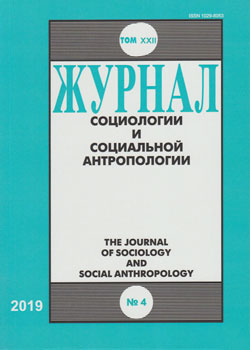Забота о стариках в интерпретациях отечественного кинематографа
Аннотация
Литература
Chivers S. (2011) The Silvering Screen: Old Age and Disability in Cinema. Toronto: University of Toronto Press.
Cohen-Shalev A. (2009) Visions of Aging: Images of the Elderly in Film. Brighton: Sussex Academic.
Cole T.R. (1991) Aging, Home and Hollywood in the 1980s. The Gerontologist, 31(3): 427–430.
Grigoryeva I.A. (2019) Starenie i transformacija prioritetov social'noj politiki [Aging and Transformation of Priorities of Social Policy]. Suhodolova A.P., Karpikova I.S. (eds.) Novye tendencii v dejatel'nosti sociozashhitnyh institutov: materialy Vserossijskoj konferencii [New trends in the activities of social care institutions: materials of the All-Russian Conference]. Irkutsk: Izd-vo Bajkal'skogo gos. universiteta: 18–23 (in Russian).
Grigoryeva I.A., Sizova I.L., Moskvina A.J. (2019) Social'noe obsluzhivanie pozhilyh: realiza¬cija Federal'nogo zakona № 442 i dal'nejshie perspektivy [Social Services for the Elderly: Implementation of Federal Law No. 442 and Future Prospects]. Monitoring obshhestvennogo mneniya: ekonomicheskie i sotsialnye peremeny [Monitoring of Public Opinion: Economic and Social Changes], 4: 125—144 (in Russian).
Jones D.B. (1950) Quantitative Analysis of Motion Picture Content. The Public Opinion Quarterly, 14(3): 554–558.
Karagoda K.P. (2016) Starost' i smert' zhenshhiny v kino [Old Age and Death of a Woman in Movie]. Zengin S.S., Gricenko V.P., Macievskij G.O. (eds.) Obrazovanie i nauka v vysshej shkole: sovremennye trendy: materialy mezhdunarodnoj nauchno-prakticheskoj konferencii (Krasnodar, oktjabr' — nojabr' 2016 g.) [Education and Science in Higher Education: Current Trends: materials of the International Scientific and Practical Conference (Krasnodar, October — November 2016)]. Krasnodar: Krasnodarskij gosudarstvennyj institut kul'tury: 168–174 (in Russian).
Lavlinsky S.P. (2018) Ontologiia starosti v sovremennoi kulture: noveishaia dramaturgiia v kinematograficheskom i literaturnom gerontokontekste [Ontology of Old Age in Contemporary Culture: the Latest Drama in the Cinematic and Literary Gerontocontext]. Vestnik Samarskogo universiteta. Istoriia, pedagogika, filologiia [Vestnik of Samara University. History, pedagogics, philology], 24(2): 77–84 (in Russian).
Mortari L. (2016) Praktika zaboty [Practice of care]. St. Petersburg: Aleteya (in Russian).
Orlova G. (2006) «Voochiju vidim»: fotografija i sovetskij proekt v jepohu ih tehnicheskoj vosproizvodimosti [«See it firsthand»: Photography and the Soviet Project in the Era of Their Technical Reproducibility]. Sovetskaja vlast' i media [Soviet power and media]. St. Petersburg: Akademicheskij proekt: 188–204 (in Russian).
Panofsky E. (1999) Smysl i tolkovaniye izobrazitel'nogo iskusstva [Meaning in the Visual Arts: Papers in and on Art History]. St. Petersburg: Akademicheskij proekt: 26–54. (in Russian).
Parfenova O.A., Petuhova I.S. (2019) Konkurencija za zabotu o pozhilyh: taktiki social'nyh servisov v novyh uslovijah [Competition in Caring for the Elderly: Tactics of Social Services in the New Situation]. Monitoring obshhestvennogo mneniya: ekonomicheskie i sotsialnye peremeny [Monitoring of Public Opinion: Economic and Social Changes], 4: 173–186 (in Russian).
Redding A. (2014) Finish Worthy of the Start: The Poetics of Age and Masculinity in Clint Eastwood's “Gran Torino”. Film Criticism, 38(3): 2–23.
Shpakovskaja L., Kulmala M., Chernova Zh. (2019) Ideal'naja organizacija zaboty o detjah, ostavshihsja bez popechenija roditelej: reforma sistemy zashhity detej kak bor'ba za resursy i priznanie [The Ideal Organization of Care for Children Left without Parental Care: Russia’s Child Welfare Reform as a Battle over Resources and Recognition]. Laboratorium: zhurnal sotsialnykh issledovaniy [Laboratorium: Russian Review of Social Research], 11(1): 57–81 (in Russian).
Smolkin A.A. (2019) Sociologija vozrasta i granicy social'nogo konstruirovanija [Sociology of Age and the Boundaries of Social Construction]. Sotsiologiya vlasti [Sociology of Power], 31(1): 8–13 (in Russian).
Susoeva A.S., Nagornaja O.S. (2016) Kul'tura starosti v Rossii i stranah Zapada: obraz pozhilyh v sredstvah massovoj kul'tury i problema social'nogo samochuvstvija [The Culture of Old Age in Russia and the West: the Image of the Elderly in Media Culture and the Problem of Social Well-Being]. Vestnik Soveta molodyh uchenyh i specialistov Cheljabinskoj oblasti [Bulletin of the Council of Young Scientists and Specialists of the Chelyabinsk Region], 4(15): 98–101 (in Russian).
Tkach O. (2015) «Zabotlivyj dom»: uhod za pozhilymi rodstvennikami i problemy sovmestnogo prozhivanija [“Caring Home”: Care for Elderly Relatives and Problems of Cohabitation]. Sotsiologicheskiye issledovaniya [Sociological Researches], 10: 94–102 (in Russian).
Usmanova A.R. (2007) Nauchenie videniju: k metodologii analiza fil'ma [Learning to see: towards a film analysis methodology]. Jarskaja-Smirnova E.R., Romanov P.V., Krutkin V.L. (red.) Vizual'naja antropologija: novye vzgljady na social'nuju real'nost' [Visual anthropology: new perspectives on social reality]. Saratov: Nauchnaja kniga: 183–204 (in Russian).
Vovk E. (2005) Stariki v sem'e: osobennosti mezhpokolencheskogo vzaimodejstvija [Old People in the Family: Features of Intergenerational Interaction]. Otechestvennyye zapiski [Homeland Papers], 3: 171–184 (in Russian).
Yahnke R. (2005) Heroes of Their Own Stories: Expressions of Aging in International Cinema. Gerontology & Geriatrics Education, 26(1): 57–76.
Zdravomyslova E., Nizamova A. (2019) Miry institucional'noj zaboty: sovmestnoe prozhivanie i konflikty v pansionate dlja ljudej starshego vozrasta [Institutional Care Worlds: Cohabitation and Conflict in Nursing Home for Elderly]. Borozdina E.A., Zdravomyslova E.A., Temkina A.A. (eds.) Kriticheskaja sociologija zaboty: perekrestki social'nogo neravenstva [Critical Sociology of Care: the Crossroads of Social Inequality]. St. Petersburg: Izd-vo EUSPb: 217–251 (in Russian).






